Why Are My Giant Bird Of Paradise Leaf Edges Turning Brown?
The question is regarding brown leaf edges on a Giant Bird of Paradise. A few reasons cause this along with splitting leaves.
I receive so many questions here, on my videos and via email. I decided to start a segment called “Ask Nell” because you all might have the same questions and/or be interested in the answers. The first one comes from Patti regarding her Giant Bird Of Paradise, or Strelitzia nicolai.
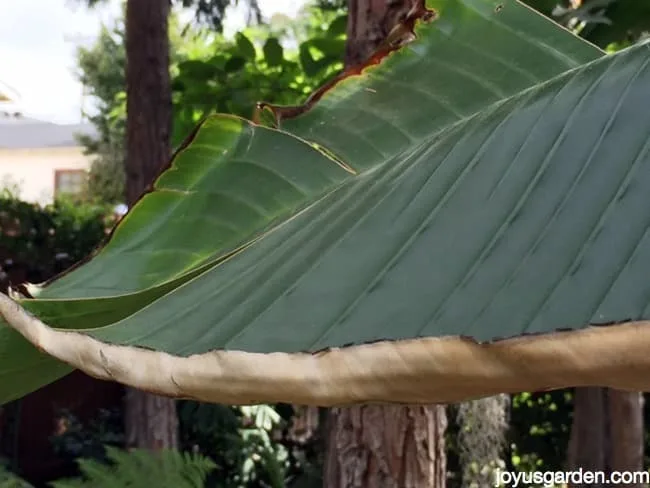
The photo you see above was sent to me by Patti. These plants are native to subtropical coastal forests of South Africa where the humidity is higher and there’s more rainfall.
This is especially true in California these days as we’re in the midst of a megadrought; yes, it’s extreme. It’s common for the edges of these plants brown but nowadays they’re downright crispy because even the maritime layer, aka fog, has been almost nonexistent.
You can see my Giant Bird of Paradise in this video as well as the Bird of Paradise you are probably more familiar with:
Also, you see a lot of split Giant Bird Of Paradise leaves and that is because of the wind. As with most plants, the older leaves will brown, yellow and split more than the younger ones.
The leaves get browner and more raggedy as they get older. They don’t need much water at all once they get established but we haven’t been receiving enough winter rain to hold them through our dry months. After all, they do need some water … not no water.
So Patti, water yours deeply every 2-3 months (until we get some substantial winter rains) and give it a 2-3″ layer of some rich, organic compost to help hold that moisture in. The compost will also enrich the soil naturally making the roots and the plant grow stronger.
The bottom line:
You can reduce the brown edging to an extent but if your Giant Bird Of Paradise is in a windy area, the leaves will split. Nothing you can do about that!
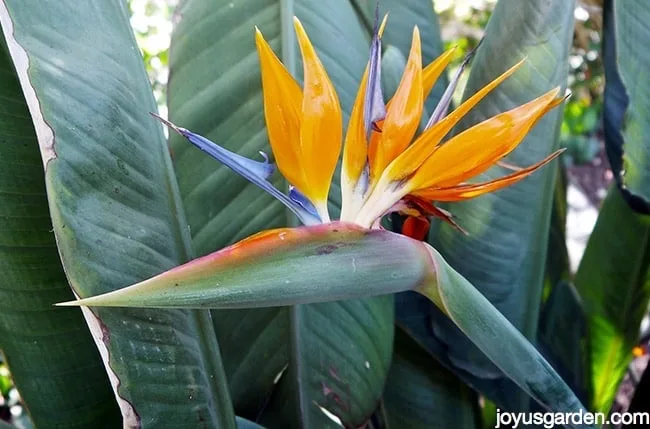
I’m including a bit about the Bird Of Paradise, Strelizia reginae, in here because the same applies to them. It’s not as noticeable on them because their leaves are smaller and seem to be a bit tougher. I’ve been noticing quite a bit of leaf curling on these plants around town because we’re so darned dry.
If you happen to have 1 as a houseplant and the edges are brown, it’s because the air in our homes is much drier than they’d like it to be. The average home is not the subtropics after all!
Thanks for the question Patti. If any of you have a question for me regarding plants, flowers and/or gardening, simply leave it below this post, in the video comment section or send it to info@joyusgarden.com (if you do this, please put “ask nell” in the subject line). Now let’s get gardening and make the world a more beautiful place!
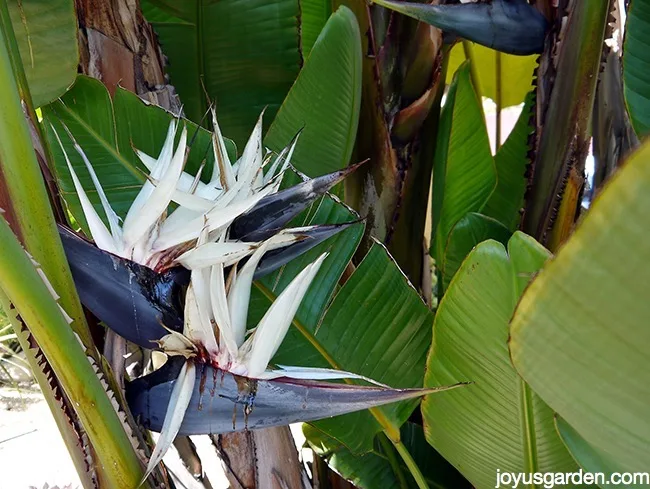
This post may contain affiliate links, you can read our policies here.

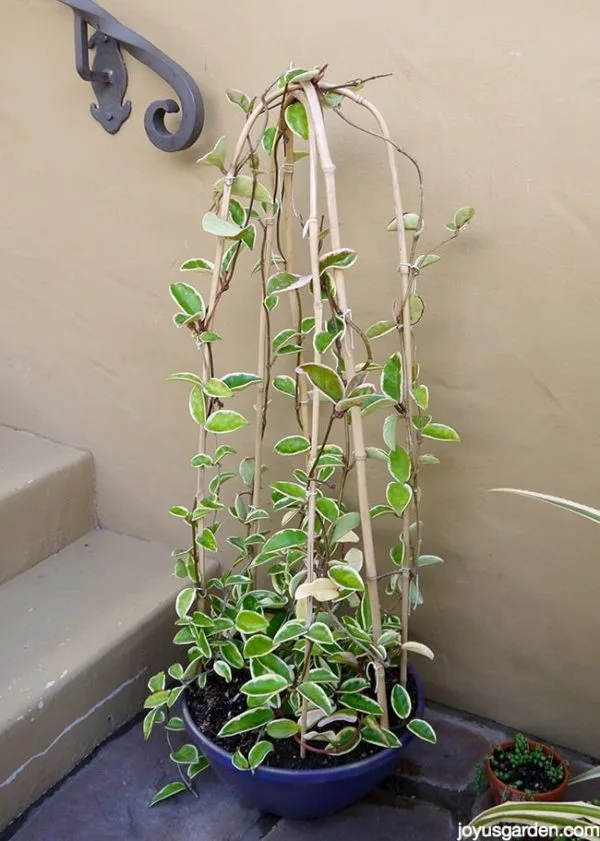
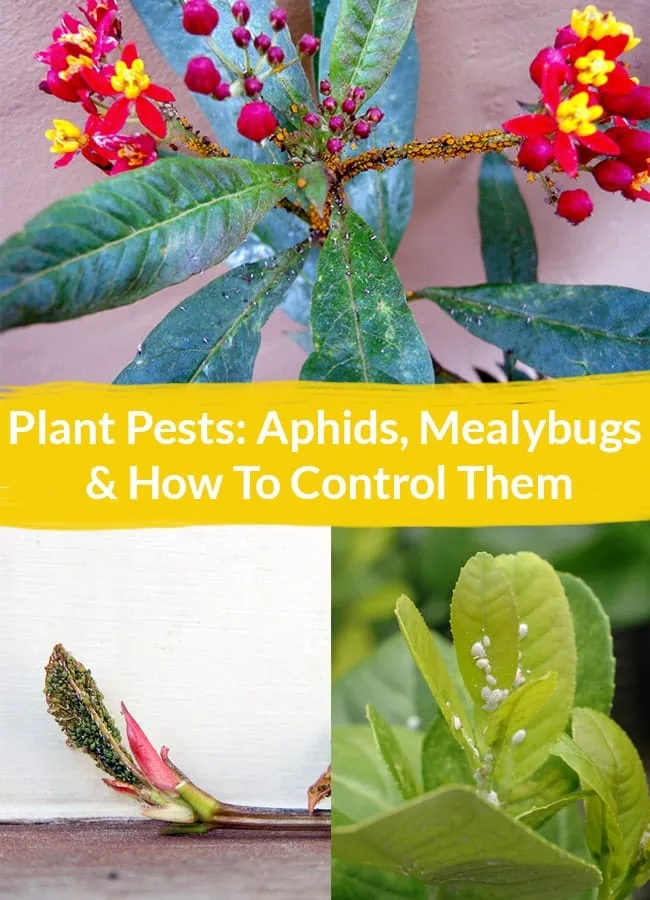
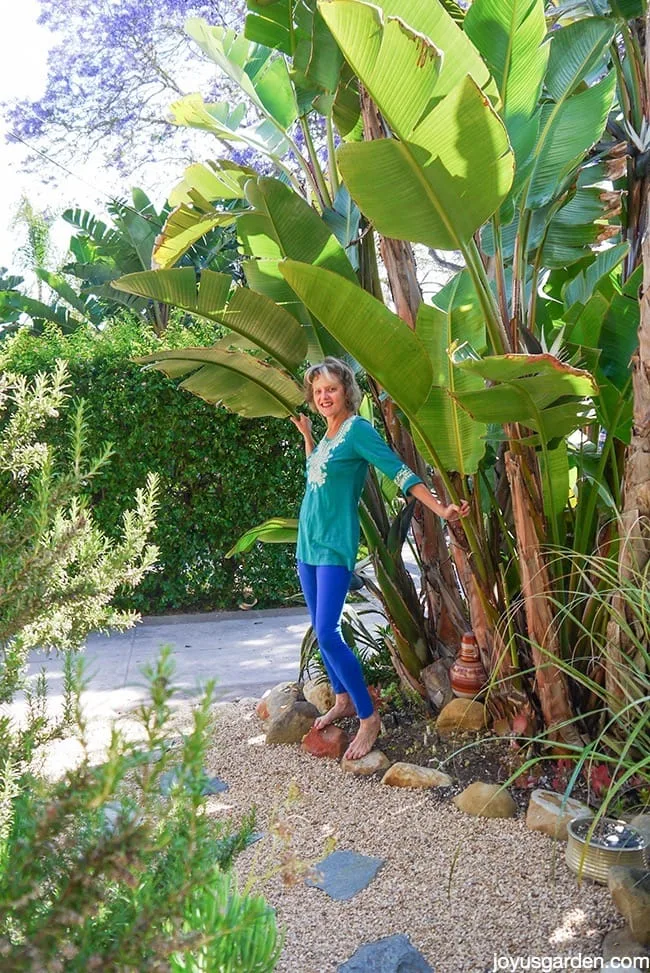
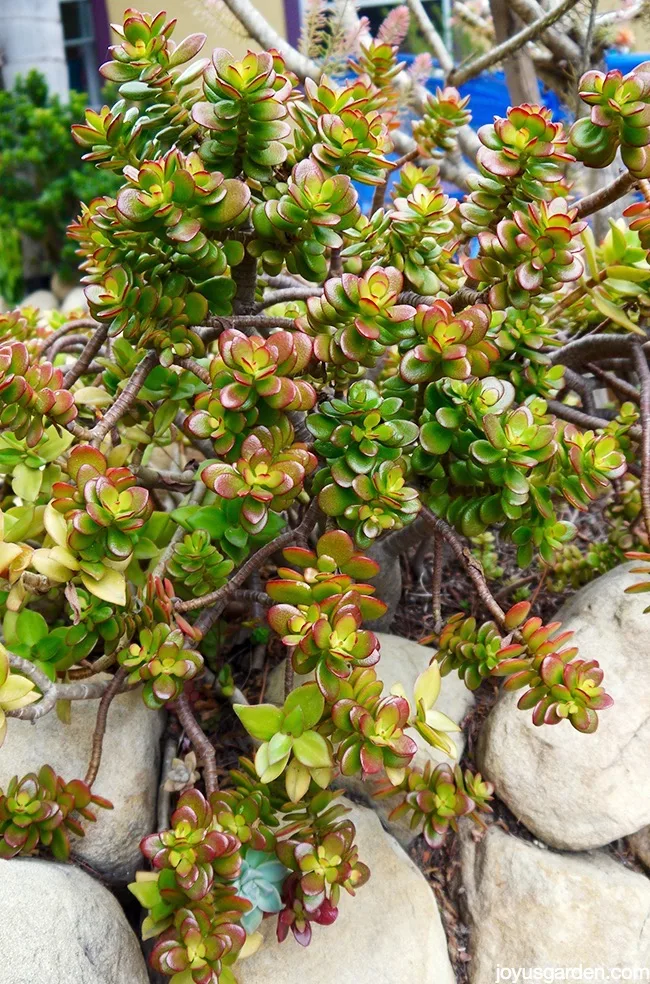
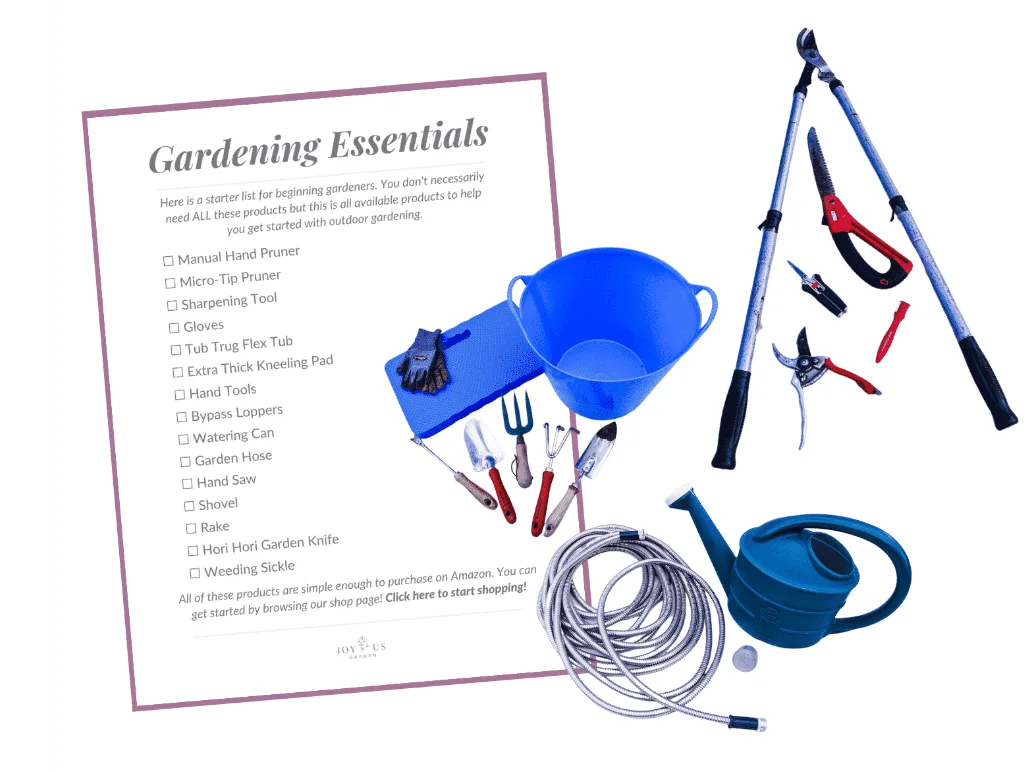
Love the video on the white bird of paradise. But I need your help, been looking but can’t find out why my small, orange bird, the leaves are spotted, and like little white spots on them
Hi Rick – It could be a mold or mildew but most likely it’s an insect like scale or mealy bug. Is it growing indoors? If outdoors, where? Can you scrape the spots off? Nell
Hello Mrs. Nell I love the video and you are Awesome, I have a question I brought my plant from Home Depot it look like a Bird of Paradise but I don’t know if it is or not. It also have green and white plants around the bottom. Can you Please tell me the type of Plant I have and the little green and white one at the bottom.
Thanks a million and God Bless you Dearly.
Hi Craig – Thank so much for your kind words! Yes, what you have is a Giant Bird Of Paradise. The striped plant at the base is a Variegated Pleomele reflexa or Song Of India. You need to give them as much light as possible (these are not low light plants!) & be careful not to over water them. Hope that helps! Nell
I loved this video and I hope it helps my plant. I have had my plant for 3 years and it is 6 ft high now. When I bought it, it was about 3ish ft. I have never had a flower on my plant and was wondering what I could do to help it to flower. Please let me know
Hi Cheryl – The Giant Bird Of Paradise can take some time to flower, up to 6-10 years. So, be patient. They like lots of sun, well drained soil & regular water. Mine flowers almost all year long but it’s 19′ tall & over 25 years old. Nell
I have a bird of paradise and I was growing it inside. I decided to put it out doors this summer and now the leaves are turning brown and curling a little. What should I do? Do I bring it back in? Thanks
Danelle
Hi Danelle – That’s usually a sign of it being too dry. I just did a post on BOP care that you might be interested in: https://www.joyusgarden.com/bird-paradise-plant-care/ Nell
Does bird of paradise bloom inside as a house plant?
Hi – Yes it can but they need a lot of light to bloom. The chances of it blooming are higher if it can spend the warmers months outdoors. Nell
My plant had, finally, after five years first two flowers. But before it would bloom, it started to turn brown and was dying. Does anyone know why? I had to cut both off and when looked inside, the flower was soggy and dark brown.Thank you
Hi Anita – I believe that is a fungal disease. This is common in periods when it’s wet & cool. Nell
Hi there
I have 8-10 yr old large bird of paradise, white. The leaves are all split. looks like a banana plant. They come out nice but quickly split. Any way to stop this. Some food? More water??
Hi Chris – There’s nothing that I know of that you can do, it’s just the nature of the plant. In windy conditions, the mature leaves will split even more. Nell
Hi, my giant bird of paradise is turning yellow all over and the leaves are drooping. We have others either side that are flourishing so not sure why this one isn’t?
Thanks heaps
Allyson
Hi Allyson – It’s hard to say why 1 plant flourishes & the 1 next to it doesn’t. I can tell you that yellow leaves on a GBOP are due to too much water or too little water. They don’t like to be too wet or too dry. Perhaps the drainage in that 1 spot isn’t as good as where the others are growing. Nell
I live in North Dallas. I bought a bird of paradise while out in San Diego about 17 yrs ago. It has grown, made a change of location with us 11 yrs ago in the same pot, but I replanted it in the ground near a water spout. It grow, died back in winter, came back in summer until I put it in a new pot, about 3 yrs ago, that could be protected over winter. It has never bloomed. I know, it’s been through a lot and hung in there. Should I just give up or do you think it will ever bloom?
Hi Joan – It takes them a while to flower after being transplanted because they actually bloom better when slightly pot bound. It’s gone through a few experiences which would deter blooming. I’d give it more time. They bloom best in full sun by the way. Nell
Hi,
I have 2 of the plants inside my house. none of them have bloomed so far. One of them has sticky, substance dripping from the leaves onto my wooden floor all the time. Is this normal?
Hi Raj – The flowers of a Giant Bird of Paradise secrete sap but it sounds like that’s not causing it. Your plants most likely have some kind of insect infestation. The insects suck the sap (which is sticky) from the plant & then secrete what they can’t consume. Nell
Hi Nell,
I have bird of paradise plant in my office (plenty of sun) that I got from Home Depot. It’s growing beautifully and seems very happy, but sometime a new leaf will tear before it unfurls completely, such that the bottom portion is partially unfurled and the top stays tightly closed. This happens only with the biggest, tallest new leaves. Any suggestions about how to prevent this?
thanks!
Hi Barbara – BOP leaves tend to tear – it’s the nature of the beast. Indoors, it could be caused by too little light, too little water or the humidity levels are too low; or a combination of the 3. I can’t really say because I don’t know the environ it’s in or how you’re watering it. Nell
Hi Nell,
I live in Phoenix and just bought a white bird of paradise. I would like to grow it outdoors but am concerned that our 100+ degree summers might be too much for it. Am I limited to growing it in a pot and moving it to a shaded area during the hotter months? How much sun/how high a temperature is too much for it?
Thank you!
Lisa
Hi Lisa – I’m not 100% sure but image the hot summer temps & strong desert sun would be too much for it. They’re native to the coastal areas & forests of South Africa. Mine was growing 7 blocks away from the beach in Santa Barbara – much different climate! Growing it in a pot to give it protection would be best. Be sure to give it adequate water in the hot months. Nell
Hi Nell. Had my bird of paradise(about 5 foot) in pot outside for bout 6 months but as the cold weather approached we put a breathable cover over and took it off today and all the leaves are brown…is there anything we can do to get back to being green again? Thanks Andy.
Hi Andy – If the leaves are brown, you won’t be able to get them green again. You can cut the plant down to 10-12″ in spring & new growth will eventually appear. My neighbors did that to 2 of theirs growing outdoors & they came back beautifully. Nell
My bird of paradise is growing very well but I have to clean the underside of the leaves every few days. I scarape little white seed looking things off of them. What do you think they are and what can I do to prevent them from coming back?
Hi Ann – I’m not sure what you’re describing but it could be scale or mealybugs. BOPs are subject to both. You can check out posts I’ve done here: https://www.joyusgarden.com/categories/#plant-pests Nell
Hi Nell my orange bird of paradise has not grown since I put it in the ground 2 years ago. Now the top tips of the leaves are dying. It is in morning sun/afternoon shade position. I haven’t done anything but water it. I guess I need to give it some tender loving care or I will lose it. I am quite hopeless in the garden. I live in Melbourne, Australia. Any suggestions appreciated. Thank you.
Hi Diana –
Oh dear! They’re tough plants once established. When the tips of the leaves start dying, a few common causes are: poor soil drainage, not enough soil prep, not enough light, too much water, too much fertilizer, &/or transplant shock. I hope this helps, Nell
Hi Nell, my indoor 2 yo bird of paradise was repotted recently and since then, the leaves have been drooping, so much so that the roots are being lifted up over the soil. It’s still located in the same position as before and I am still watering it as much as possible but it still doesn’t look good. What can I do to fix it? Thank you for your help
Hi Vicky – The leaves are most likely drooping because the roots can uptake enough water. Drooping leaves can also be due to over watering, but because the plant was recently transplanted, I’d say it’s not getting enough. I’m sure sure if it’s growing indoors or outdoors so it’s hard to give advice. You want to keep it evenly moist but never over saturated. My neighbors completely cut down their 2 BOPs & they came back beautifully so that’s an option if need be. Nell
Hi I have a tall birds of paradise indoor in a sunny lit room it’s about 2.5m just wondering I water it once a week and I noticed one of the leaves is curling is that normal in winter as its winter here in sydney
Hi Rimz – It’s hard to say but here are a couple of possibilities: it could have insects (houseplants are prone to spider mites in the winter when the dry heat comes on or perhaps if it’s been in its pot for a while, it needs to be repotted. Nell
Hi I purchased a bird of paradise from Costco about 3 months ago and repotted into a new pot because it came in that plastic store container. Everything was fine I watered it throughly and I put decorative rocks on the very top. I used compost and organic soil and top soil in the container all mixed. The plant is indoors but on top of my staircase and it get lots of light from windows that are right over and aside from the plant. The plant has two sections of plants of that makes sense and I just noticed that one row of the leaves started to curl completely and the ones on the ends wilt a bit. The other section of leaves are perfectly fine. I water maybe every 2to 3 weeks when I feel top of soil is dry. I don’t want it to die. Lots of new leaves are coming in though from both sections. What can it be? I will include a picture it’s night time now I hope it shows up
Hi Mayra – A bit of curling is normal for these plants. Especially when growing indoors, the leaves of a BOP will curl as a reaction to repotting. They open back up over time if they have enough water & light. Other reasons could be: infestation of spider mites (BOPs are subject to these indoors) & the plant is too dry or has dried out too much at 1 time. Nell
Hello! I am enjoying your blog! I am a new Bird of Paradise owner and absolutely love her. Or should I say them? It appears that there are 4 plants in my pot! I have a question about the leaves. I have noticed that some of the leaves form a “cupped” shape towards the tip. Is this normal behavior or does it indicate a problem? Thanks!
Hi Kari – I don’t know if your plant is a houseplant or growing in the garden. Some reasons for BOP leaves curling inward are: adjusting to being repotted, too much wind & not enough water. Nell
Hello! My BOP is doing really well however new leaves are opening and they don’t have pointy tips it’s like they are burnt off almost the leaves aren’t curling or wilting so I’m not sure if they need more water or if there’s something I need to do to have them develop differently? Thanks so much!
Hi Kiana – The leaves of a Giant Bird of Paradise are naturally not as pointy as the Bird of Paradise. Nell
I’ve seen Giant BOP’s so large they are lifting up sidewalks and breaking out of brick gardens. I’d love to plant this in my backyard for shade but I don’t want the roots to go nuts and break up all my cement. Do I accomplish this by planting inside of something to contain the roots?
Steven – Their root systems are deep & strong. Mine never tore up the driveway or the curb. I’m not sure about the root guard as I’ve never used 1 for this plant. Nell
Is a print version of your book going to be made? I would prefer a hands on version of your book. Don’t like kindle.
Lydia – I totally understand. No plans to print it at the moment. Nell